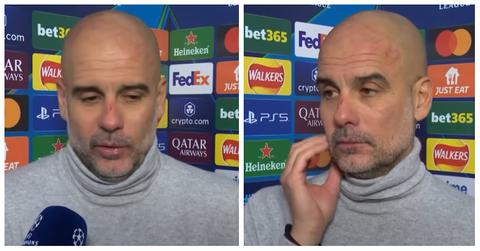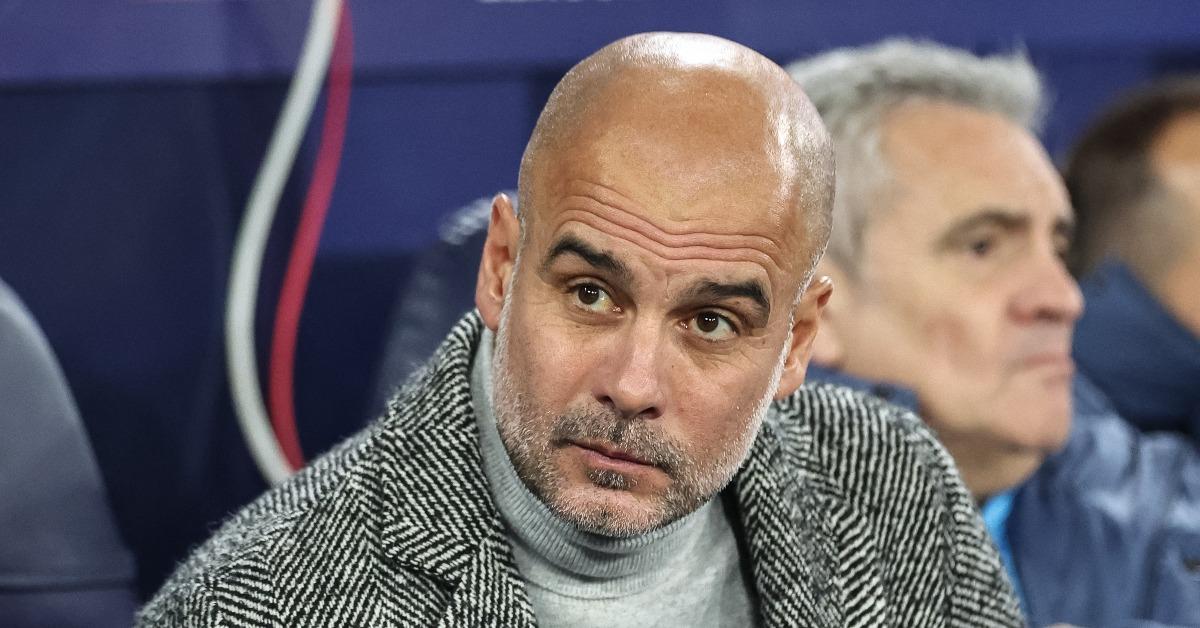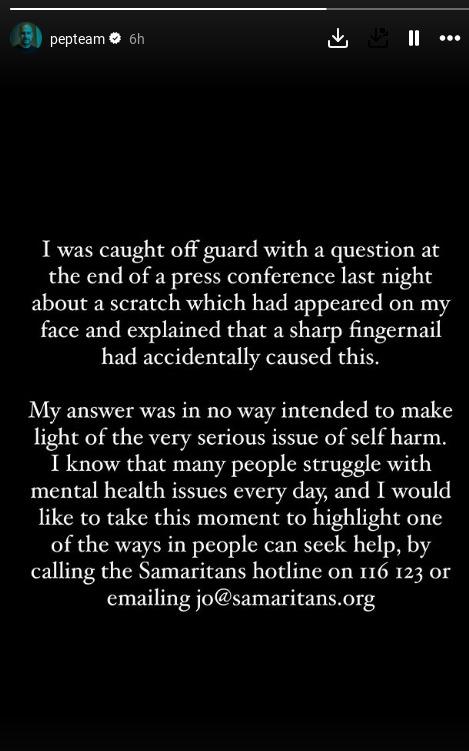Facial Wounds Explained: Here's What Happened to Pep Guardiola After Man City Draw
"My answer was in no way intended to make light of the very serious issue of self-harm."
Published Nov. 27 2024, 12:49 p.m. ET
Content Warning: This article contains topics that may be disturbing to some readers, including issues of self-harm.
Football (soccer, to Americans) team Manchester City is perhaps best known for its rowdy and diehard fans, and those strange giant bananas. But Man City made headlines for a different reason when their coach Pep Guardiola appeared with marks and scratches on his face after Man City came to a draw with Feyenoord.
His response sparked immediate internet buzz, and has opened an important dialogue about a topic often avoided among professional athletes. This is what happened to Pep Guardiola's face.
Pep Guardiola explains what happened to his face after the Man City draw with Feyenoord.
It was a striking scene: Pep Guardiola giving a post-game interview after Man City and Feyenoord came to a draw in November 2024, with a bloody scratch on his nose and what appeared to be marks or bruises elsewhere on his face.
Interviewers asked about Pep's appearance, and he gave a shocking response. A journalist asked, "You've got a cut, and apparently some others?" Pep responded, "Yeah. With my finger here," he gestured as though he was using his finger to cut along his nose, "with my nail."
The journalist, seemingly lost for words, responded, "that's fine." Pep then shocked by adding, "I want to hurt myself, yeah." He shifted in his seat and gave a smile for the camera, but his words left a startled ripple through the sports world.
Pep's incident highlights the importance of discussing men's mental health, especially for athletes.
Later, Pep clarified his comment about hurting himself, issuing a statement on social media. He explained, "I was caught off guard with a question at the end of a press conference last night about a scratch which had appeared on my face and explained that a sharp fingernail had accidentally caused this."
He added, "My answer was in no way intended to make light of the very serious issue of self-harm. I know that many people struggle with mental health issues every day and I would like to take this moment to highlight one of the ways in people can seek help, by calling the Samaritans hotline on 116 123 or emailing jo@samaritans.org."
To the outside world, it's unclear whether Pep was joking in the original comment, as his social media statement seems to suggest, or if he was uncomfortable with the attention his comment got and walked back the original comments to avoid focus on his mental health.
On social media, fans expressed concern. In the comments of a YouTube video of one of Pep's post-game interviews, where the scratch is clearly visible, many people worried for the coach. One user wrote, "I'm actually a bit worried about Pep, he looks bad. I'd say to him, 'Don't worry mate, you've done amazing things, you can't win them all. Just chill and help your players relax.'"
Another added, "The self-harming and self-inflicted scratches on his head and nose are definitely alarming and a concern for his mental state if this form that city is on continues!"
Regardless of his efforts to smooth over the comments, Pep sparked a debate about mental health. It's an oft-avoided subject, but many high-profile athletes have been speaking out about it in recent years.
This includes big names like Michael Phelps and Terry Crews, who have helped start the conversation by opening up about their own struggles. Many athletes don't speak out because they want to be seen as capable and strong and think that talking about mental health issues may make them look weak.
Which is why it's so important for men like Phelps to have these conversations. And why so many people are intrigued by Pep's comments and worried that he's brushing over a more serious personal issue.
Talking about mental health and offering resources can be life-saving, so even if Pep might wish people would forget his original comments, the conversation they have spawned may help someone.
If you or someone you know needs help, use SAMHSA Behavioral Health Treatment Services Locator to find support for mental health and substance use disorders in your area or call 1-800-662-4357 for 24-hour assistance.


